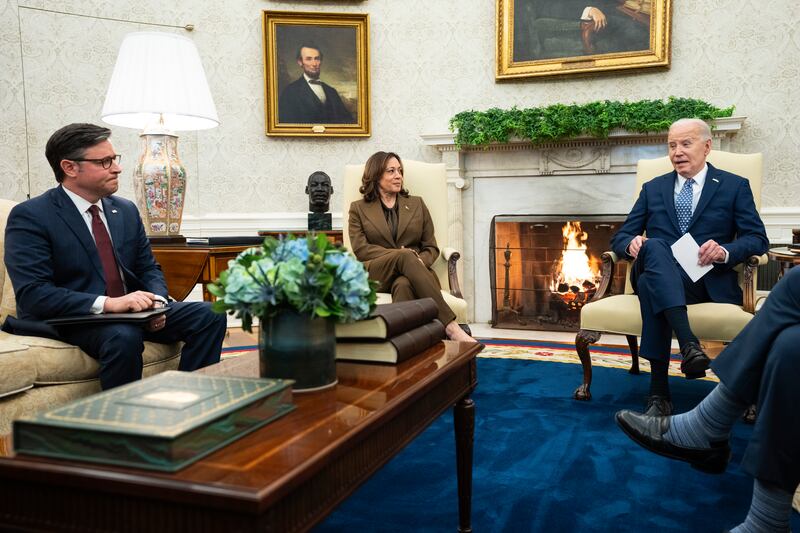President Joe Biden invited congressional leaders to the White House on Tuesday for a conversation about the most pressing issues: a looming government shutdown and the national security supplemental funding package, which addresses the border crisis and funds aid to Ukraine and Israel.
But, as The New York Times noted, the meeting didn’t result in a bipartisan deal.
Biden, alongside Vice President Kamala Harris, first spoke to the group — Speaker Mike Johnson, R-La., Senate Majority Leader Chuck Schumer, D-N.Y., Senate Minority Leader Mitch McConnell, R-Ky., and House Minority Leader Hakeem Jeffries, D-N.Y. — before the president sat one-on-one with Johnson.
“We’ve got a lot of work to do,” Biden said ahead of the meeting. He said he wants Congress to keep the government funded and agree to the foreign aid.
Johnson has faced pressure from the Senate and the White House to agree to a spending deal and avert a shutdown. But a group of more conservative House Republicans are pushing for several measures to be included, like reducing Homeland Security Secretary Alejandro Mayorkas’ salary to nothing and defunding Planned Parenthood, according to The Hill.
During the meeting, Biden advocated that bipartisan funding bills should be “free of any extreme policies,” according to the White House.
Johnson told reporters that during the meeting with Biden he repeatedly stressed what he believes is the most critical issue: “We must take care of America’s needs.” He noted that the migrant crisis at the border has emerged as the top concern for voters, Republican or Democrat, across the U.S.
“I was very clear with the president and all those in the room that the House is actively pursuing and investigating all the various options” on foreign funding, Johnson said, adding, “The first priority of the country is our border.” He said he urged Biden to take executive action to manage the crisis.
On avoiding a government shutdown, Johnson said, he is optimistic Congress will “get the job done.”
Funding for agencies related to agriculture, energy and water, transportation, veterans affairs and housing and urban development is set to expire on Saturday, according to the Senate Appropriations Committee. On March 8, funding for other departments, including Homeland Security, Defense, and Justice will also lapse.
Both Jeffries and Schumer described the meeting as “productive” and “intense” during a press conference after the meeting.
The two said Congress is “making good progress” to avoid a lapse in government funding.
“We made it clear that that means not letting any of the government appropriations bills lapse, which means you need some (continuing resolutions) to get that done, but we’re making good progress and we’re hopeful we can get this done really quickly,” Schumer said.
There was “some back-and-forth” on issues but those disagreements “aren’t insurmountable,” the Senate Majority leader added.
“The meeting on Ukraine was one of the most intense I’ve ever encountered in my many meetings in the Oval Office,” Schumer said. If Ukraine loses the war, it could fracture NATO allies while empowering “the boldest autocrats of the world,” he said.
Schumer said when Johnson brought up the border, “We made it very clear to him that we want to do something real.” But Ukraine can be finalized quickly because it has broad bipartisan consensus, unlike the border, which might take “some more work,” he said.
The Senate passed a $95 billion aid package for Ukraine, Israel, and other priorities on Feb. 13. But Johnson hasn’t introduced the legislation on the House floor.
“We said to the speaker, ‘Get it done,’” Schumer said. “History is looking over your shoulder, and if you don’t do the right thing, whatever the immediate politics are, you will regret it.”
As NBC News reported, Johnson last met with Biden on Jan. 17. They talked about the same three issues — foreign aid, border security and government funding — but in the time since, Congress hasn’t managed to reach an agreement.



